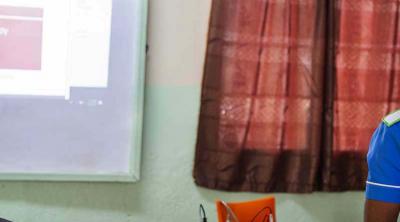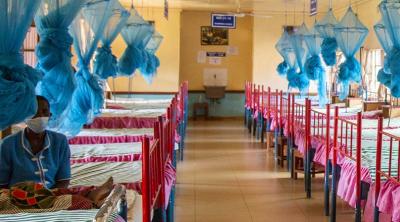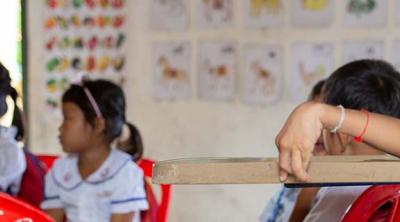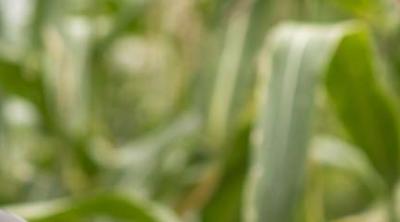CRS in Malawi
CRS began working in Malawi in 1997. Initial work focused on improving food security, with CRS carrying out Malawi's first programs with the U.S. Agency for International Development (USAID) food aid. For over 20 years, CRS worked throughout the country to implement programs in agriculture and livelihoods, health and nutrition, microfinance, water, sanitation, emergency relief, and early childhood development among others. CRS’ projects currently include services for orphans and vulnerable children, Health Systems strengthening, agriculture, natural resource management, nutrition, microfinance, and early childhood development. CRS Malawi implements its programs through partnerships with the Church, local organizations, and community entities for maximum impact and sustainability.
Safecare
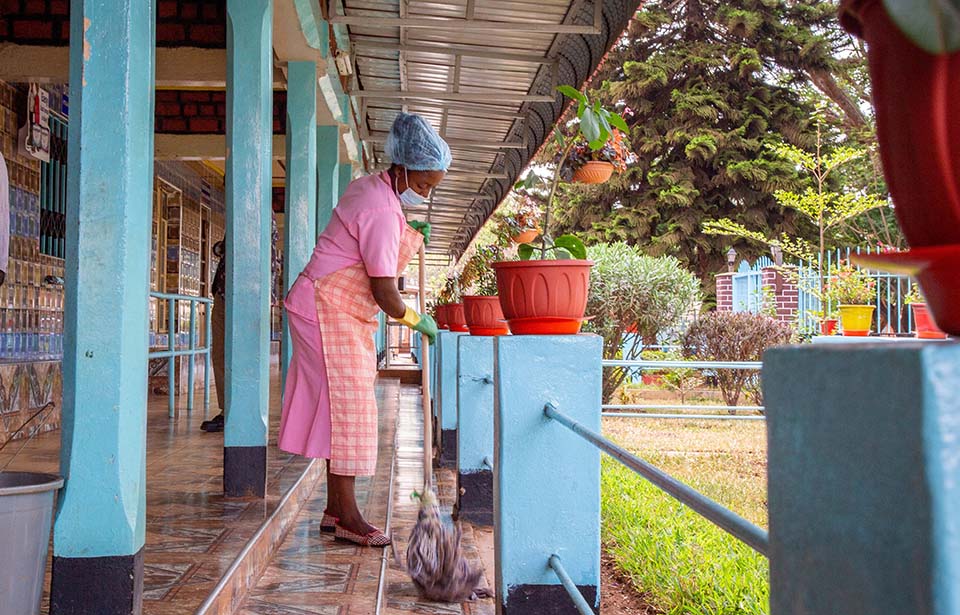
Hospital routine cleaning at Mlale Mission hospital in Lilongwe rural, Malawi at Mlale Mission hospital in Lilongwe rural, Malawi.
Photo by Dooshima Tsee/CRS
The SafeCare project implemented by CRS in Malawi is designed to help health facilities develop improvement plans and systematically improve the ability of facilities to contribute to delivery of high-quality healthcare, moving towards universal healthcare coverage in low to middle-income countries. SafeCare assesses all systems and processes within health facilities and helps them prioritize quality improvement plans, to allow continuous quality improvement and eventually achieve accreditation. This ultimately means people in communities can access high-quality health services close to their homes. They receive reliable, consistent quality services, and facilities can sustain themselves and function as viable businesses. SafeCare is currently being implemented in ten facilities in Malawi. Most of the facilities CRS works with are managed by Catholic sisters. These Sisters are phenomenal leaders, live on-site, and dedicate their lives to improving facilities over time.
Humanitarian Response
Malawi, especially the Southern Region, is highly vulnerable to the impacts of climate shocks, with significant population growth, increased pressure on land, rapid environmental degradation, and growing climate variability and change. For the past 7 years, Malawi has experienced over three major floods and two droughts that have each increased in frequency, magnitude, and scope. The CRS Humanitarian Response Unit has been responding to flood and drought-affected households by meeting some of their immediate needs such as food and essential living supplies, safe and dignified shelters, and access to water and sanitation facilities. To support their long-term needs, the CRS Humanitarian Response Unit promotes the development of resilient livelihoods. They train communities to be prepared and capable of responding to future shocks. For the past seven years, more than 230,000 households’ immediate needs have been met after floods. 70,885 households have been supported with water, sanitation and hygiene access. 90,231 households have been trained in resilient livelihoods. And 13 traditional authorities have been trained in the usage of local capacities to prepare for future shocks. 1,976 shelters were constructed, and 301 local artisans were trained in key, resilient shelter features.
Graduation Model
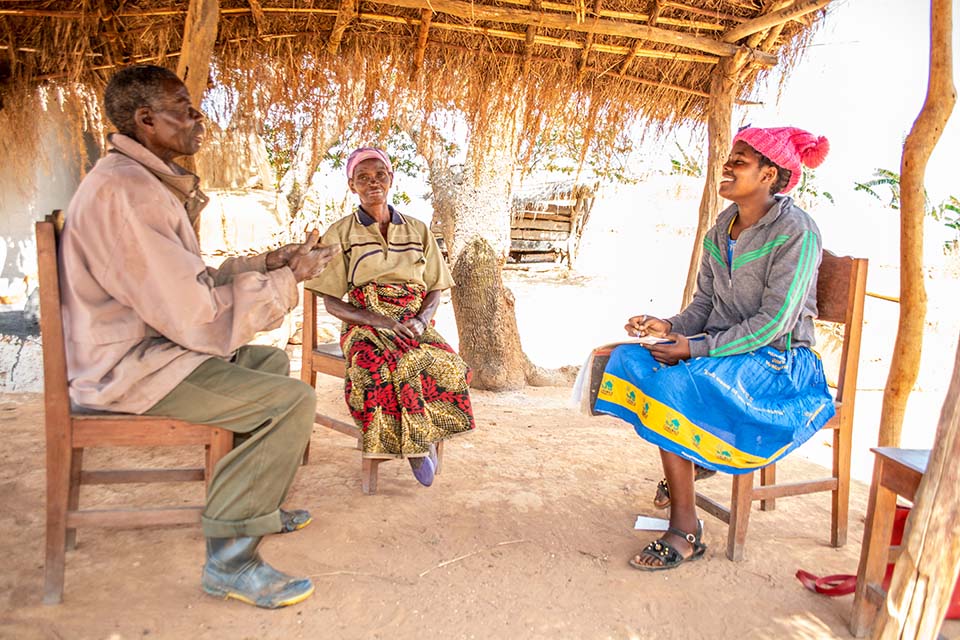
Graduation Program Household Mentor Mphatso Mleya interacts with participants during a home visit.
Photo by CRS Staff
Graduation is a comprehensive, time-bound integrated development approach that consists of a sequenced set of interventions that moves people toward sustainable, resilient livelihoods. It aims at making markets work for people in the upper tier of economically viable who still experience some poverty. It combines social protection with livelihoods support, messaging, and financial inclusion to help people move towards economic self-sufficiency.
Working in three districts of Karonga, Chitipa and Rumphi in Malawi, the project aims to alleviate the suffering of less privileged families by graduating them from extreme poverty to sustainable livelihoods in selected impact areas, aiming to reach out to 100,000 individuals.
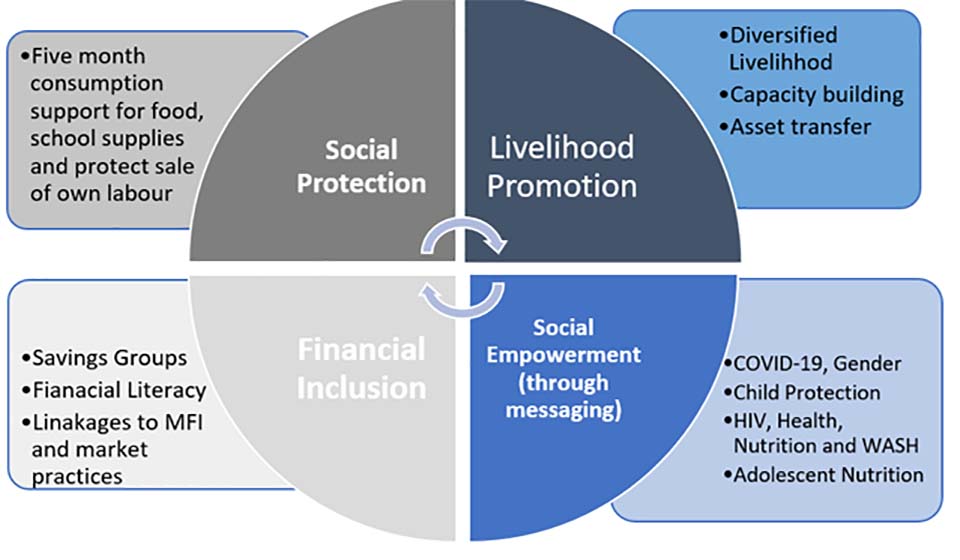
The household approach is a blend of interventions on food security, nutrition, health, financial education and savings, livelihoods, protection and education to be implemented at the household level. The approach also involves intensive monitoring, coaching and mentoring. The community approach has interventions at the community level such as a feeding program targeting schools, Community Based Child Care Centers, Sunday school and infant feeding, and borehole drilling.
The first graduation participants started in early 2020 and are expected to fully graduate by early 2023. However, some participants have shown progress to graduation including being self-reliant by engaging in multiple livelihoods and being food secure. The second group of participants started a year later in 2021 and the project will phase out at the end of 2023.
Strengthening Capacity of Religious Women in Early Childhood Development (SCORE ECD)
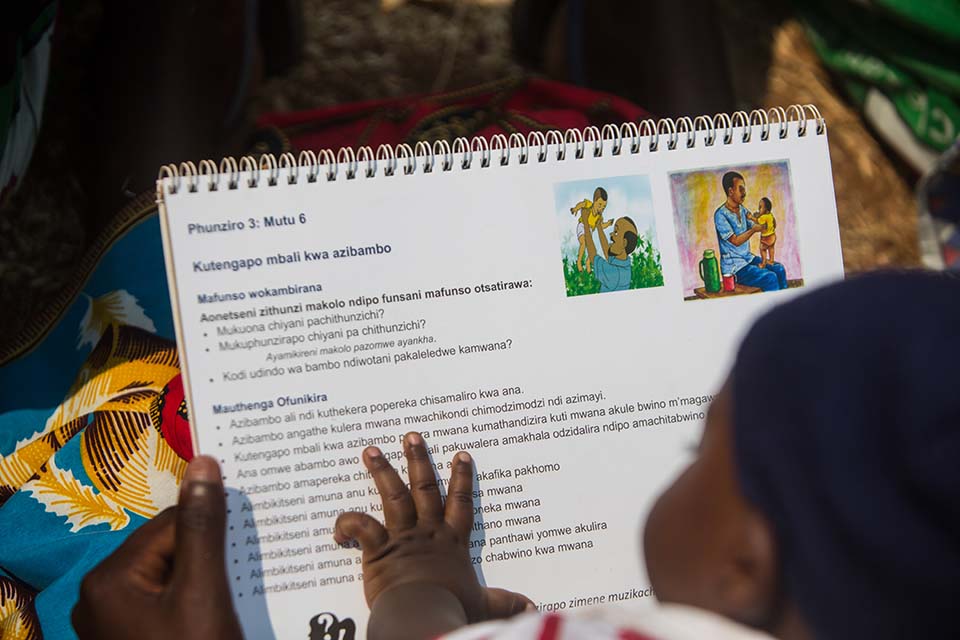
A baby looks over a manual on positive parenting outside the Early Childhood Development (ECD) space at the Nsipe Health Center in Chikavumbwa Village, Malawi.
Photo by Sara Fajardo/CRS
CRS Malawi supports the promotion of Early Childhood Education Programs to deliver nurturing care and family strengthening services to caregivers of children from birth to 3 years. Through working with the Association for Women in Religious Institutes of Malawi the project has strengthened the organizational capacity of the Catholic Sisters umbrella body.
SCORE ECD provides technical training, supervision and mentorship, establishment of key platforms and structures, strengthening referral systems, care group facilitation, home visits, Savings and Internal Lending Communities facilitation, institutional strengthening support, develop an advocacy and networking strategy and health systems strengthening through piloting the SafeCare quality improvement model in Catholic health facilities in Malawi. Maternal mental health integration, family and couples strengthening by Strengthening Marriages and Relationships through Communication and Planning (SMART) Couples, household economic strengthening through Savings and Internal Lending Communities.
SCORE ECD has built the capacity of 30 AWRIM secretariat and congregation sisters in the care group approach of implementing ECD social and behavior change interventions, CRS and Malawi Government ECD curriculum, Savings and Internal lending communities following the Private service provider model, SMART couple family strengthening approach, Integrated Mother Baby Course approach of managing maternal mental health issues.
CRS has supported AWRIM and the 7 congregations to establish 54 care groups, identified and trained 22 care group promoters and 538 cluster leaders with whom they are cascading ECD SBCC messages to households with children under 3 years and pregnant women by conducting fortnight care group sessions and home visits. The sisters have registered 538 neighbor-women groups from 5,725 households which are being reached with the SBCC messages.
Malawi Green Corps
Climate change and deforestation has increased the number and strength of cyclones in Malawi. Therefore, revitalizing landscapes is critical to improving Malawi’s economy and preventing climate-related shocks. Malawi Green Corps is an environmental project by Malawi Government, funded by UNDP that aims to revitalize 5,000 hectares of degraded land and forests across Malawi and create products from waste. UNDP works through CRS to provide financial management services.
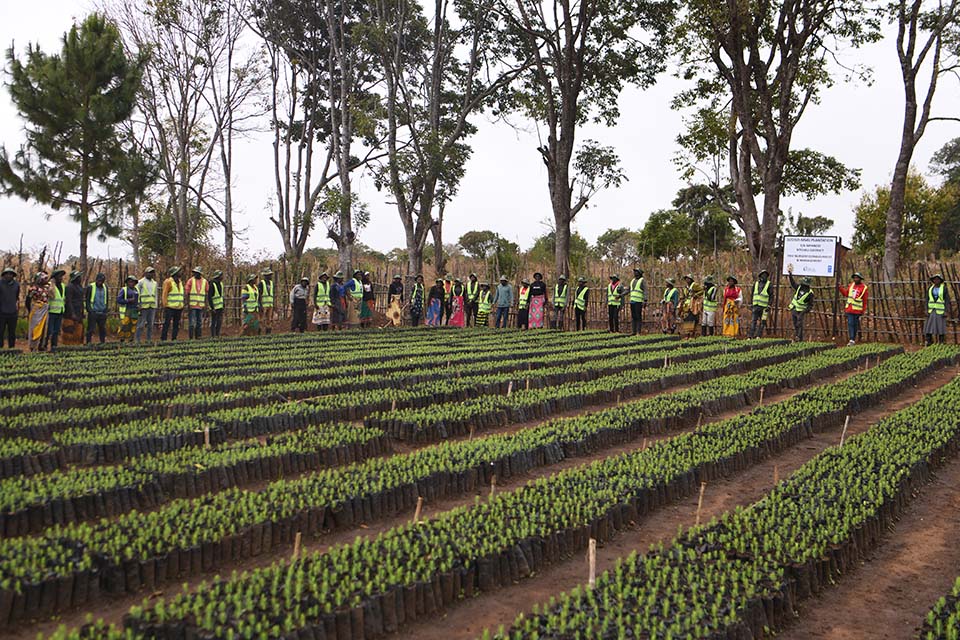
Tree Nursery at Dzodzi-Mvai Plantation in Ntcheu District.
Photo courtesy UNDP
Malawi Green Corps supports Malawi Vision 2063 in transitioning to a greener economy and maximizing the potential of the youth as agents of economic development. Malawi Green Corps is aligned to the UN’s Decade on Ecosystem Restoration (2021-2030) which aims to prevent, halt, and reverse the degradation of ecosystems. The project draws lessons from the Malawi Youth Forestry Service and initiatives outlined in Malawi’s COVID-19 recovery plan.
The 24-months project is being carried out in 10 districts of Lilongwe, Salima, Dedza, and Ntcheu in the Central Region, Karonga and Mzimba in the Northern Region, and Machinga, Mangochi, Blantyre, and Zomba in the Southern Region.
Malawi Green Corps works through the districts to restore critical hotspots identified by the government. CRS provides human resources and financial services to recruit and train up to 2,000 youths between the ages of 18-35 in 10 districts in environmental and forestry management, entrepreneurship, and forest-literacy.
The selected youths are engaged for a maximum period of 4 months per cohort. Through the trainings, the youth gain skills and opportunities to build their capacity to create green jobs for themselves, provide employment to others, and build a green economy. The recruited Malawi Green Corps’ members are supervised on a day-by-day basis by CRS under the overall monitoring of UNDP Malawi in collaboration with the government technical department under the Ministry of Natural Resources and Climate Change formally Ministry of Forestry and Natural Resources.
Projects Achievements to date
3,000Ha cumulatively under restoration in all the district.
2,000 seedlings raised in readiness for the tree planting season.
Over 160 youths in waste management hotspots embarking in green jobs initiatives through waste recycling, repurposing, and reusing. (Group and individual businesses targeting production and selling of organic fertilizers, briquettes and reusing products made from waste collected in market and illegal dumping places.)
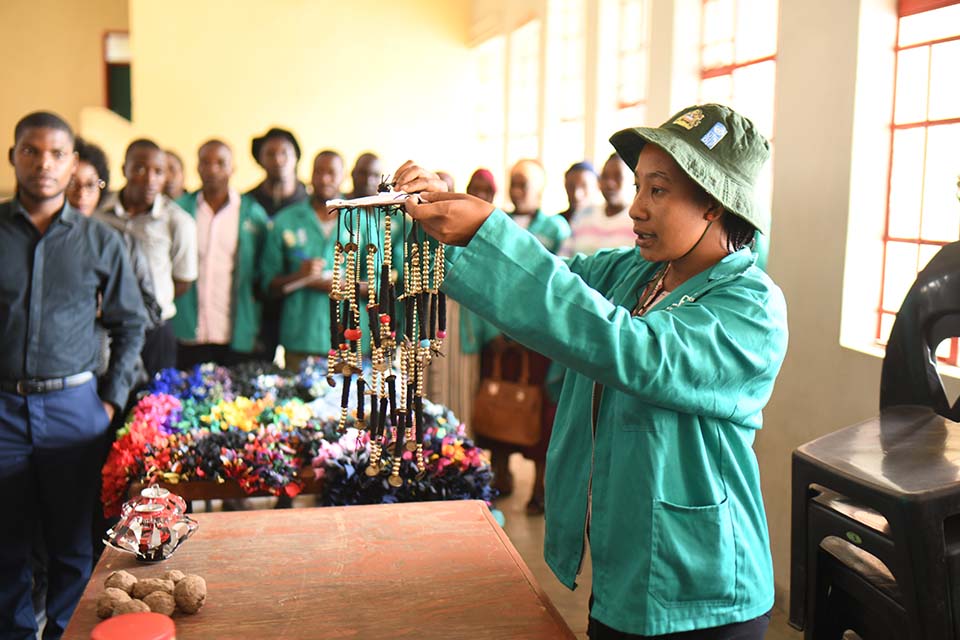
Demonstration of recycle products at Mangochi Waste Management Site.
Photo courtesy UNDP
Malawi Green Corps has increased capacity of the youths to engage in savings and internal lending groups and expand their conventional and green businesses through the monthly stipends they receive. The skill building drive of the project provides an opportunity for the youth to demand special skills related to job employment.
Growing Hope Globally
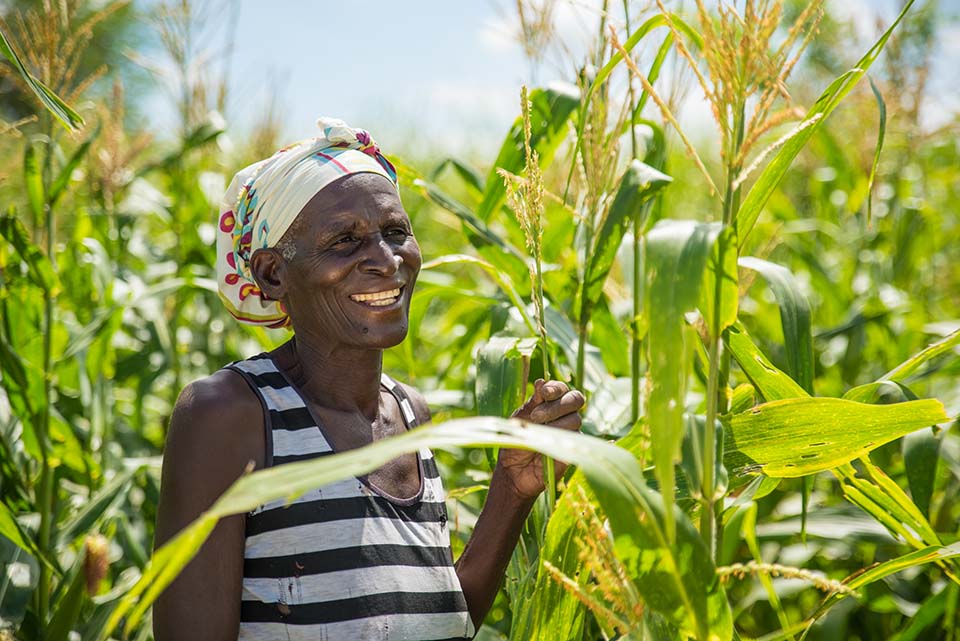
A program participant walks through a corn field.
Photo by Lauren Carroll/CRS
CRS Malawi partners with Farmer Services Unit of Farmers World Limited and AGORA Limited in the implementation of the Mlimi Patsogolo “Building Business Linkages Through Farmer Organization”. The project is implemented in direct collaboration with the Malawi Government’s Nsanje and Chikwawa District Agriculture Extension Coordinating Committees. The goal of the Mlimi Patsogolo GHG project is to improve food security among small holder farmers in vulnerable communities in Nsanje, Chikwawa and Blantyre districts by improving productivity and strengthening market engagement.
The Mlimi Patsogolo project facilitates sustainable, market driven and locally led efforts among the marketing model’s key actors, marketing private service providers, marketing groups, farmer learning centers, and newly introduced Agora’s Farm Services Unit which has agriculture extension frontline staff called Argonauts. Agronauts operate from Agora Agriculture Inputs shops to work with farmers from surrounding areas, demonstrating and explaining the different farm inputs, equipment they sell, and how best to optimize production from farmlands by using the inputs and services they offer.
The project targets 5,000 rural farming households (22,500 people) gradually and systematically through creation of business linkages between the farmers and farm input suppliers and produce buyers through a community-based fee-for-service agents’ model.
Rapid Feedback Monitoring System (RFMS)
Globally, poverty is being recognized as dynamic rather than static, with poor households facing high levels of unplanned risks in response to shocks, stresses, and seasonal extremes. In Malawi, where the majority of the population lives in rural areas, poverty is high, and livelihoods and food security rely heavily on rain-fed agriculture, short- and long-term shocks such as floods, droughts, and disease outbreaks can be devastating to households and communities. Effective resilience programming necessitates an evidence-based, multidimensional understanding of how communities are affected by and cope with shocks in the short and long term, as well as how this changes over time. Unfortunately, most approaches to measuring resilience rely on annual surveys, which fail to capture seasonal shifts or how resilience fluctuates before, during, and after a short-term shock.
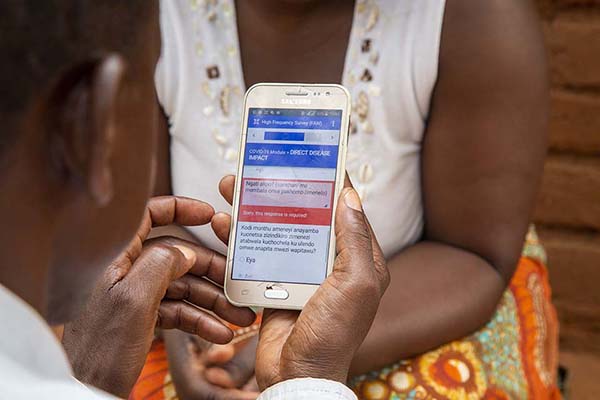
Enumerator Joe Aggrey Majausya goes through survey questions with respondent Sylvia Chinsamba. Photo by Dooshima Tsee/CRS
Recognizing the need for better, more collaborative insight on resilience, poverty and wellbeing in Malawi, Catholic Relief Services and Cornell University developed the Monthly Indicators for Resilience Analysis approach to provide an innovative solution for monitoring resilience in a frequent and in-depth way while fostering agility in resilience programming. By working closely with the community-based enumerators, the project generates and distributes monthly reports to the village development committees, and they, in turn, share the data with other community members, as well as district-level personnel from the line ministries. Over the past five years CRS has engaged with 6,492 households in 256 communities in Southern Malawi to collect monthly data. Communities have used this information to identify priorities, develop community action plans and advocate to government and other actors for change in their communities.
CRS Malawi is currently working with USAID, the World Bank, the UK Department for International Development, CRS, and Cornell University who co-designed the RFMS as an innovative approach to build a sustainable infrastructure for frequent measurement, in collaboration with Malawian institutions including the National Statistics Office and the Centre for Social Research at the University of Malawi’s Chancellor College. This unique partnership is funded and guided by a multi-stakeholder governing board. The RFMS directly supports Malawi’s National Resilience Strategy and Malawi Vision 2063. It creates feedback loops for improving design and monitoring of both locally- and donor-led interventions, with the eventual goal of permanently transferring the capacity to the country’s local systems to accelerate development outcomes.
Launched in 2020, the RFMS is working in 10 districts in Malawi’s Southern Region, targeting 4,500 households. The districts align with USAID/Malawi’s Resilience Focus Zone. In March 2022, the RFMS expanded to 3 urban centers: Blantyre, Zomba and Mangochi, with an aim of understanding the dynamics of resilience, vulnerability and poverty in the peri-urban areas bringing the total number of households to 5,526. Ultimately, the RFMS could be expanded nationwide and become a Malawi-owned process to support transformative country-wide resilience.
Stats
People served: 1,226,911
Population: 19,129,955
Size: 45,747 sq mi; slightly smaller than Pennsylvania
Our Partners
Become a Partner ›CRS' History in Malawi
Catholic Relief Services began working in Malawi in 1997 at the invitation of the Episcopal Conference of Malawi. Initial work focused on improving food security, with CRS carrying out Malawi's first programs with U.S. Agency for International Development (USAID) food aid. Today, CRS Malawi implements food security, emergency response, nutrition, WASH and capacity building activities funded by both public and private donors throughout the eight Dioceses of Malawi.
In response to a major drought across southern Africa in 2001, CRS and seven other agencies formed the Consortium for Southern Africa Food Security Emergency (C-SAFE). The consortium later transitioned into a 5-year Food for Peace development program, led by CRS and CARE and funded by USAID. In 2009, CRS got another 5-year USAID for Peace grant for an integrated food security program, which was implemented by eight NGOs. The Wellness and Agriculture for Life Advancement (WALA) program aimed to reduce food insecurity in almost 215,000 chronically food insecure households in southern Malawi. In addition to helping communities prepare for and cope with food insecurity, programs promoted irrigation, improved agricultural practices and a focus on nutrition and health.
In 2014, CRS won another Title II program, entitled Ubale (Partnership in Chichewa). The five-year, $60 million program works through government, community, and private-sector systems and structures to provide full coverage to inhabitants of the districts of Nsanje, Chikwawa, and rural Blantyre.
CRS Malawi is working to deliver culturally appropriate early childhood development and health services to thousands of children, including orphans and vulnerable children such as those affected by HIV and AIDS. In another program, funded by the Conrad Hilton Foundation, CRS Malawi supports Catholic Sisters to improve their technical capacity in early childhood development (ECD), increase organizational sustainability, and enhance their networking and learning on ECD.
Working with the Catholic Church in Malawi, CRS has also managed to develop other innovative, high-quality programs to address continued health, HIV and AIDS, economic empowerment and WASH concerns.

